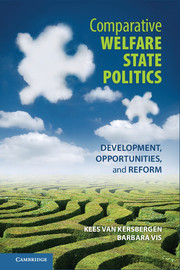Book contents
- Frontmatter
- Contents
- List of Tables and Figures
- Preface and Acknowledgments
- 1 Introduction
- 2 The Welfare State
- 3 The Logics of the Welfare State
- 4 Welfare State Regimes
- 5 What Do Welfare States Actually Do?
- 6 Toward an Open Functional Approach to Welfare State Reform
- 7 Why Do We Need to Reform the Welfare State?
- 8 Why Do We Need to Reform the Welfare State?
- 9 Why and How Do Politicians and Governments Pursue Risky Reforms?
- 10 Can and Will the Welfare State Survive the Great Recession?
- References
- Index
2 - The Welfare State
Dynamic Development, Crisis, Resilience, and Change
Published online by Cambridge University Press: 05 June 2014
- Frontmatter
- Contents
- List of Tables and Figures
- Preface and Acknowledgments
- 1 Introduction
- 2 The Welfare State
- 3 The Logics of the Welfare State
- 4 Welfare State Regimes
- 5 What Do Welfare States Actually Do?
- 6 Toward an Open Functional Approach to Welfare State Reform
- 7 Why Do We Need to Reform the Welfare State?
- 8 Why Do We Need to Reform the Welfare State?
- 9 Why and How Do Politicians and Governments Pursue Risky Reforms?
- 10 Can and Will the Welfare State Survive the Great Recession?
- References
- Index
Summary
Social Needs, Risks, and Disruptions in Permanently Modernizing Capitalist Nations
The history of the welfare state and its reform is a history of political actors struggling to cope with social needs, risks, and disruptions caused by rapid social and economic development. Paying attention to the “objective” problem pressure to which political actors respond is crucial for explaining past and contemporary welfare state reform. History may never repeat itself, but in many ways and irrespective of regime form or level of development, the problems of societal disruption, social needs, and risks that tend to emerge in the wake of what we conveniently call “modernization,” as well as the social and political struggles to deal with them, are strikingly similar across time and space (Wilensky and Lebeaux 1965 [1958]; Flora and Alber 1981; Flora and Heidenheimer 1981b). Take as an illustration the following quotation from a recent study of social policy in China and read it while keeping 19th-century Britain or Germany in mind:
Chinese leaders should … be ashamed of a high degree of capitalist exploitation and class suppression in the process of economic modernisation. Over the past three decades, China’s economic growth has been achieved at the expense of the well-being of hundreds of thousands of members of deprived groups: poor rural residents are always worried about medical care and retirement; urban migrant workers have been excluded from accessing urban public services; many factory workers are working long hours in extremely hazardous work environments; farmers whose land was expropriated have not received proper compensation; and thousands of poor patients are unable to afford treatment. The commonly perceived “gradual economic reforms” have actually brought about tremendous changes in welfare provisions and have rapidly destroyed China’s socialist welfare system, leaving millions of poor people unprotected. There is obviously a gap between China’s economic development and its social development.
(Chan et al. 2008: xiii)The social needs, risks, and injustice described are not identical with but are still very similar to what we see described in, say, Marx’s analysis of the struggle over the working day in DasKapital (1867, chapter 10), in Engels’s examination of the suffering of the working class in Victorian England in DieLage der arbeitenden Klasse in England (1844), or, much later, in Polanyi’s study of the impact and the reaction to the social dislocation caused by the unrestrained capitalist free market in The Great Transformation (1944).
- Type
- Chapter
- Information
- Comparative Welfare State PoliticsDevelopment, Opportunities, and Reform, pp. 10 - 30Publisher: Cambridge University PressPrint publication year: 2013
- 1
- Cited by



